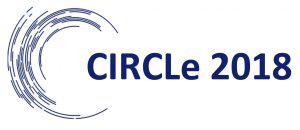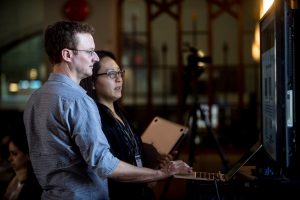CIRCLe
Understanding the Theme
This symposium was conceived over several months of conversations with fellow staff and faculty involved with the 3-year TLEF project “Educational and Career Outcomes for UBC Arts Students: Towards a New Paradigm.” The structure and design of this event aligns with the understandings and questions that emerged from e-portfolios being implemented within certain courses and programs in the Faculty of Arts. CIRCLe 2018 is a complex network of multiple interconnected themes and questions regarding e-portfolios as a tool for representing learning and professional identity development. The symposium’s individual sessions, consisting of presentations and breakout group discussions, respond to the various connections and pathways between each of the sub-themes that make up CIRCLe:
(Capture) + (Integrate) + (Reflect) + (Connect) + (Learning through Assessment/Evaluation) with e–Portfolios
…..
CAPTURE
- Capturing learning and knowledge of both emergent and constructive teaching and learning processes and personalized ways of knowing, through writing and multimedia forms.
- Representing learning, knowledge, interests, skills and projects in ways that target the intended objective, purpose and audience.
- Capturing and representing one’s identity and one’s experience as a learner.
- Capturing might mean… archiving, evidence of learning, sorting artifacts, importance of being selective, professional vs. student, clear communication of career goals, networked ability to choose from multiple versions, the inherent editing nature of blog tools, etc.
INTEGRATE
- Integrating that which has emerged out of capturing, collecting and reflecting learning and knowledge (ie. artefacts, writings, blog posts, etc.) into visual and communicative forms.
- Integrating (or connecting) learning across different courses and/or disciplines.
- Integrating the platform of e-portfolios to align with the learning outcomes of a course’s content and assignments, ultimately preparing students for a “learning career” (Penny Light, 2012) that merges what they do in university and college to what they do in professional life.
- Integrating might mean… developing skills for navigating and communicating in internet culture, understandings of convergence cultures, online ethics, digital literacy as essential netiquette, research skills, personal vs. professional identities and how to manage multiple profiles, etc.
REFLECT
- Reflecting on what has been captured, collected and represented, and perhaps on the process of reflecting itself.
- Reflection and reflexive thought and practice: “Reflection means thinking about the conditions for what one is doing…Reflection occurs when one mode of thought is confronted by another. Metatheory is about a comprehensive frame of reference for inspiring and structuring reflection. We call our suggestion for such a frame of reference ‘reflexive interpretation”(Alvesson & Skoldberg, 2009, p. 169-170 – Reflexive Methodology: New Vistas for Qualitative Research).
- Reflecting might mean… e-portfolio as process/ing, reflective writing, reflective vs. reflexive, narrative, creative thinking, inquiry, value of failure, etc.
CONNECT
- Connecting experiences and knowledge gained across different areas of one’s life (courses, extra-curricular, life experience) to understand/determine potential career and life goals.
- Collaborating with and learning from peers, faculty, and professionals within the context of a networking and sharing culture.
- Connecting might mean… Creating a network of people to share with and follow online, notions of network vs. networking, value of dialogue in a digital society, peer review, individual vs. team environments, the roles of instructor and student, establishing an inquiry-driven approach to learning technology, self-initiative, informational interviews, demonstrating evidence of collaborative ways of working
LEARNING (through) ASSESSMENT/EVALUATION
- Learning to assess the value of e-portfolio/online tools from within a complex and relational network of capturing, reflecting, integrating, representing, connecting, and/or collaborating. Portfolio assessment is a kind of learning through assessment (Maki, 2003).
- Assessment might mean… how faculty have adjusted to assessing the learning that occurs with e-portfolios; the role students take in peer assessment; the shift from assessment of a narrow set of skills and behaviors to a broader vision of professional identity and ability; rethinking if student learning outcomes need to change to align with the temporal/invisible kinds of learning connected with e-portfolio development; ability for programs to track learning in different ways; determining if e-portfolios are more or less successful when incorporated into the requirements of a student’s degree; what is the future worth of this digital tool?

